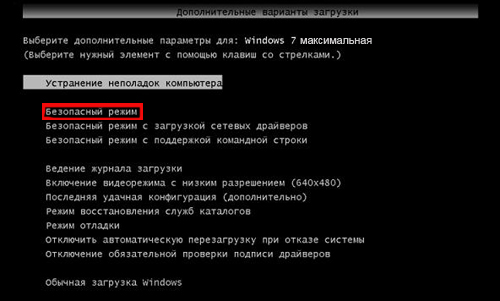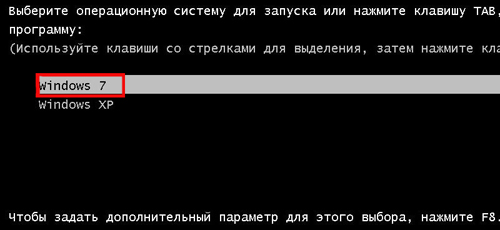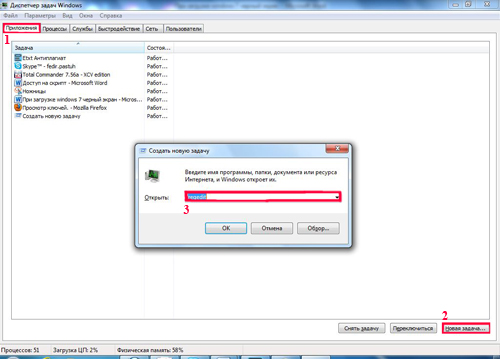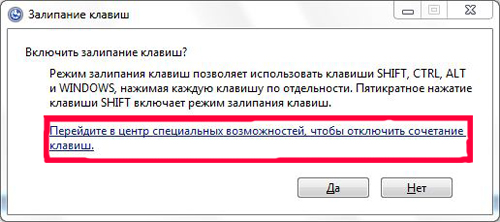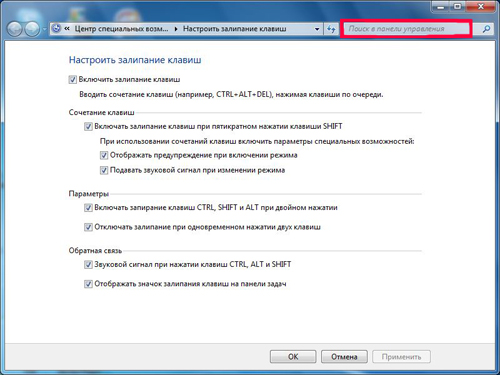Like everything else in our world, computer technology is not eternal. At some point, personal computers experience malfunctions. Sometimes they lead to complete equipment failure. One of the most common problems is a black screen when turning on the computer. What is the cause of this problem and can the situation be corrected? Below we will try to understand this.
Monitor problems
When you start your computer, a black screen may appear due to a malfunctioning monitor. This is evidenced by the absence of any inscriptions on the screen and sound signals from the PC speakers. Typically, this breakdown is caused by using the monitor for too long. In order to protect yourself from such a nuisance, it will be enough to handle the display carefully and install a surge protector.
Cable fault
The next reason why the computer does not turn on and the screen continues to remain black is the cable that supplies power to the video card. It can be damaged if handled carelessly, for example, while wiping off dust. Also, squeezing it under furniture often causes the cable to fall out of the connectors. To fix the problem, just secure the cable firmly in the socket. If the cord is damaged, then you cannot do without purchasing a new part.
Tip: problems with the cable will never arise if you carefully clean it and protect it from pets.
Faulty or incorrect connection of the video card
This problem is determined very simply - a black screen appears immediately when you turn on the monitor, and rebooting does not help. It appears as a result of prolonged use of the video card, as well as excessive heating. system unit. For prevention, it is recommended to install an additional cooler that will work to cool this device. If your video card breaks down, it is better not to try to fix the problem yourself, but to trust a specialist.
CPU or RAM failure
When you turn on the computer, a black screen with inscriptions appears or the PC emits intermittent beeps. The causes of failure can be very diverse - from the lack of a power filter to oxidation of contacts and mechanical damage. Precautionary measures in this case will be the installation of a UPS and the network filter already mentioned above. These devices will protect your PC from overheating and power surges.
Hi all! In this article, I suggest you find out the reasons for the black screen when booting Windows. Most of you, I think, have observed such a picture when, when you turned on your computer, instead of loading the desktop, a black screen appeared, or, as it is also called, “Malevich’s Painting,” in which you were asked to select the option of subsequent loading operating system. If you don’t understand what I’m talking about, then I recommend that you read today’s article.
The appearance of a black screen when loading the operating system confuses many users, due to the fact that they have not previously encountered this type of malfunction when booting the computer. In turn, users begin to have questions: why is it loading? black screen on bootWindows 7 ? And for what reason does the operating system not load and, most importantly, what are the typical reasons associated with the appearance of a black screen when the computer boots?
One thing I can tell you is that the appearance of a black screen when you boot your computer is already a signal that your computer contains some errors that can affect the functioning of the entire operating system. Do you know what mistake many users make when they find a black screen on their computer when loading? The mistake users make is that they immediately panic and begin to reinstall the operating system, hoping to completely get rid of this problem. Agree that knowing the problem of a black screen, you can solve it yourself more in a simple way, thereby saving your money. First, I would like to say a few words about why a black screen may appear at all.
In general, we can say that the reasons for the appearance of a black screen when the operating system tries to boot successfully can be in a variety of situations. As an example, I will give you a situation when the electricity in your house was suddenly cut off, and at that time you were working at the computer. Here you have an incorrect shutdown of the computer, which in many cases is also accompanied by the appearance of various types of errors in the computer, which in turn is accompanied by the appearance of a black screen. There are also problems that arise directly in the hard drive itself (malfunction), which leads to damage or deletion system files, here is another example of a black screen appearing when loading Windows.
It is also impossible not to mention another factor, which in turn contributes to the implementation malicious code into the system, as a result not only the appearance of a black screen, but also the freeze of the entire computer as a whole. I think you already guess that we are talking about viruses. Therefore, ensure reliable protection of your computer by installing a reliable anti-virus program, and also check your computer more often for viruses and Trojans.
We just have to find out why there is no information on the monitor screen about loading the operating system, as usually happens when you turn on the computer. Of course, if suddenly the situation is complicated by the fact that complex repairs are required computer equipment, then in this case you cannot do without the help of qualified specialists. I suggest you consider the reasons why a black screen appears when the operating system tries to boot successfully. And before you contact qualified specialists, first of all, try to diagnose yourself, since in most cases, as is usually the case, black screen on bootWindows 7 occurs due to the fault of the users themselves.
Monitor status!
Yes, dear users, monitor, this is where you should start a full check. Is there any electrical power supplied to the monitor at all? In practice, I had one such case when a user could not turn on his computer for two days and was about to take it to a service center. More precisely, the system unit, as usual, turned on accompanied by sound signal, but the monitor would at least blink. In general, the problem was that the user, when reinstalling the computer in another room, did not fully install the power cable into the monitor. What was his expression when I told him what the problem was that his monitor wasn’t working? Therefore, be sure to check the secure fastening of all wire contacts, both in the monitor and in the system unit. Monitor connectors (VGA or DVI) must be securely screwed not only to the monitor, but also to the system unit.
In addition, you can check the functionality of the monitor in the following way; to do this, you will need to disconnect the cable that connects it to the system unit and turn on the power of the monitor itself. If, when you turn on the monitor, the indicator on it lights up and a message appears on the screen, for example, “No Signal,” then the likelihood of the monitor malfunctioning in this case will be low. Well, it’s better, of course, to connect the monitor to another system unit (laptop) in order to fully verify its serviceability.
Black screen when loading Windows 7
So, let's move on, our monitor is working properly and when we turn on the computer we see the following picture. Instead of the desktop that is familiar to us, on which there should be program shortcuts, a black “screen of death” loads, in which you need to select a download option.

In this case, the fault should be identified in the system unit personal computer. As can be seen from the figure below, to further launch the operating system you will be offered one of the boot options. You also need to make sure that the computer successfully enters “Safe Mode”. To do this, you will need to periodically press the F8 key when turning on the computer. Next in the menu that appears “ Additional options Boot" go to the "Safe Mode" section and press the "Enter" key.

For those who do not know why the system exists safe mode, then in a nutshell, I will tell you that the existence of a safe mode in the operating system in many cases is an indispensable tool. After all, it is thanks to safe mode that an operating system can be loaded that did not start, for example, due to the computer being infected with viruses.
There are several options for starting safe mode.
Safe mode– basically this mode is launched, which contains a minimum set of services and programs. This mode starts if you do not need to use the network or the Internet.
Safe Mode with Boot network drivers – this mode precisely involves launching a service to work with the network.
Safe Mode with support command line – in this mode it is possible to use command input when working with the system. This mode is typically used by administrators.
Let's say that you successfully entered safe mode, then the desktop successfully loaded, in this case it is quite possible that the black screen when loading the computer occurred as a result of a software failure (a specific service failed). For example, quite often users install some program or driver for equipment, and the next time they turn on the computer, a black screen appears. In such a situation, I recommend that you delete recently installed program or a driver for a recently installed piece of hardware that appears to be causing the black screen.
In any case, if you have successfully entered safe mode, then do not be lazy to perform a full scan of your computer for viruses. To do this you will need to use special utilities to check your computer for viruses, and also to make sure that there are no malicious codes in the system registry. You can find out the most complete information on how to scan your computer for viruses and identify the most vulnerable spots in the operating system from the following articles:
Moreover, it should be noted that there are situations when viruses and Trojans were found and neutralized in the system, after which the black screen disappears and the computer boots successfully, but shortcuts and the Start panel are not displayed on the desktop. In this case, you can follow these steps to additionally scan your system for malicious codes.
1. Press “Ctrl+Shift+Esc” and in the window that opens, go to the “Applications” tab. At the bottom of the window, click " New task" In the window that opens, enter “regedit”.
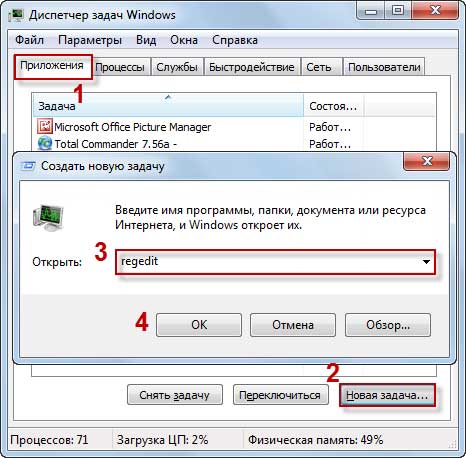
HKEY_LOCAL_MACHINE/SOFTWARE/Microsoft/WindowsNT/CurrentVersion/Winlogon
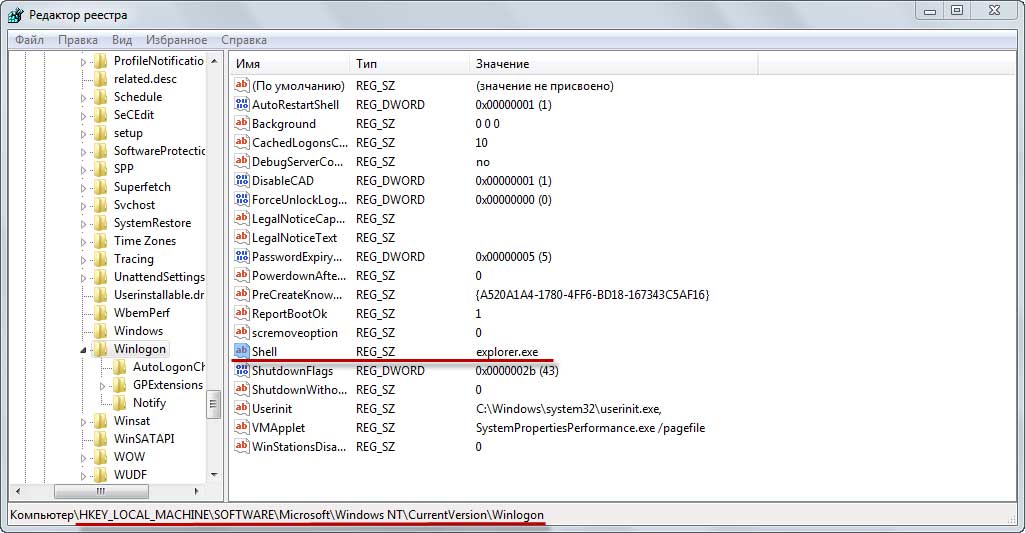
The "Shell" parameter should only contain the value "explorer.exe" and nothing else. If you find additional values in this parameter, delete them and leave only the value “explorer.exe”. The presence of any entries in this parameter is extremely rare, but it’s still worth checking.
A rather interesting situation occurs when we cannot yet open the task manager, since it is locked and the computer does not enter safe mode. In this case, you can use another simple method. Not all novice users know about “Sticky Shift Key”. So I’ll explain, if you press the Shift key five times, the “Sticky Keys” window will appear.
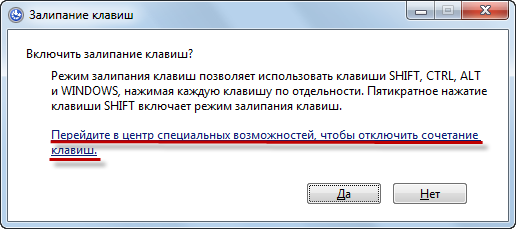
1.The first thing you need to do is follow the link that is indicated in the “Sticky Keys” window.
2. In the search bar, enter “Task Manager”.
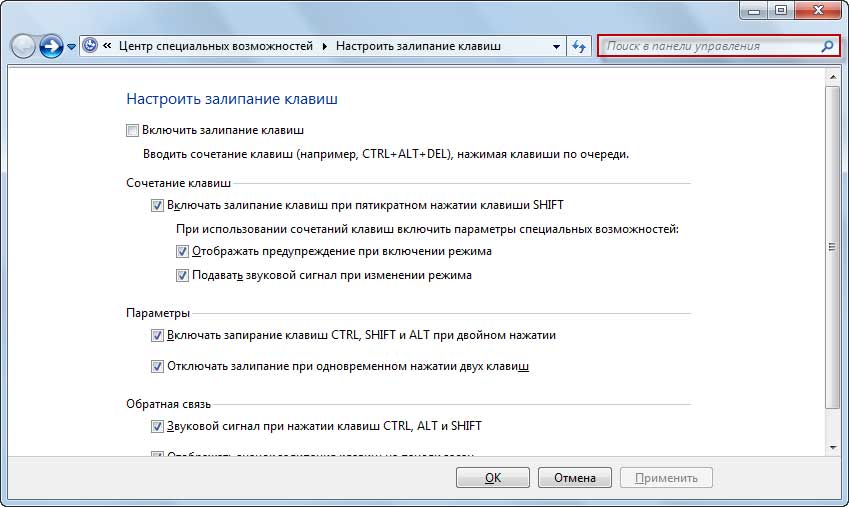
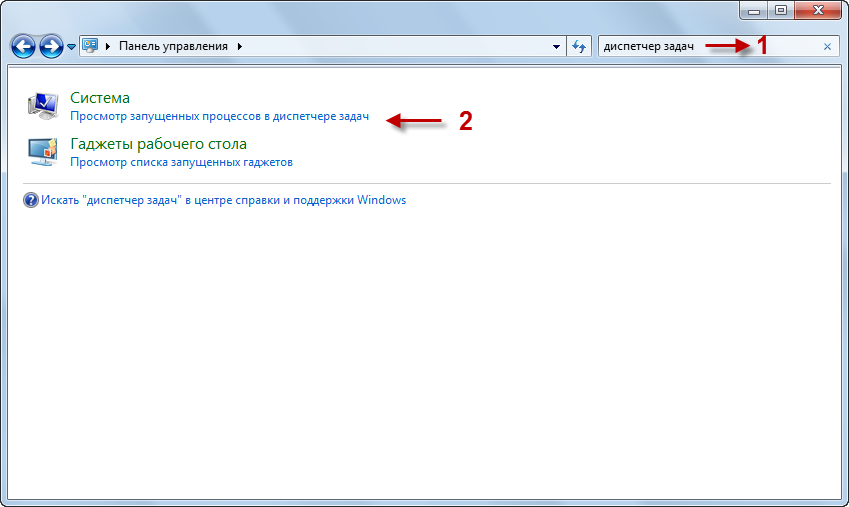
4. Now you just have to select the “System Protection” item.
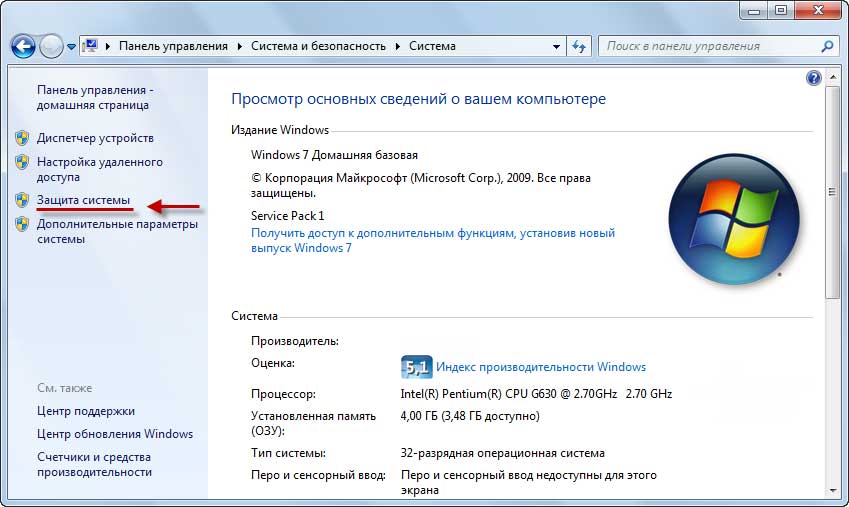
5. Finally, perform a recovery using previously created checkpoints. You can learn more about system recovery by reading the article “How to restore your computer after a failure.”
For additional information I can suggest you read the following articles:
It often happens that video card drivers stop functioning properly and as a result the monitor is no longer able to display the set screen resolution. Here is another additional reason that you will definitely need to check.
You bought a computer, or it was given to you, or you new job is now in use. You rejoice like a child, this is the most interesting toy, listen to music and establish a video connection with someone on Skype, play games, surf the Internet, watch a movie. It allows you a lot, but... It happens that suddenly, and this always happens suddenly, the computer does not turn on. Yesterday everything was fine, and today a misfortune happened.
This article will help you classify the problem, localize it, and not make it worse.
Let's break it down point by point:
1 - The computer does not turn on- that is, in general, it does not respond to pressing the button, the fans do not spin.
2 - The computer turns on, but except for the whirring of fans and the blinking of lights on the system unit nothing else happens, the monitor screen is dark.
3 - The computer turns on, but there is something written on the screen in white letters on a black background.
4 - Blue screen- The computer turns on, the operating system starts to load, but then the screen turns blue and something is written on it in white letters
5 - The computer turns on, the operating system loads, but A banner appears on the screen blocking work.
1 - The computer does not turn on
First of all, don't panic.
Open the side cover of the system unit and carry out preventive cleaning.
Do you see how much dust there is? And dust is our first enemy. Take a regular brush and knock off all the dust, then vacuum it up.
Dust is dangerous because when humidity changes, it becomes conductive, which leads to short-circuiting of electronic components.
Dust clogs the cooling system of the processor, video card, and power supply, hence overheating and failure of these elements.
Cleaned it? Let's continue.
Let's look at the power supply.
To do this, disconnect all power wires from the devices.
CD drive, hard drives, video adapter, FDD drive if you have one.
Power wires are those wires that provide power to devices. They usually have 4 wires, two black and one red and yellow. +5 and +12 volts are supplied to them.
Disabled? Now we try to turn on the computer.
Happened?
We connect the wires back, but! One by one, starting with the video card. This way we can find out which device is preventing the computer from turning on.
Did not work out? Computer won't turn on? We are trying to replace the Power Supply.
By disconnecting two connectors on motherboard long and four-pin.
Did everything work? Great, plug everything back in, close the lid and continue working.
Computer still won't turn on? You are on your way to the service center. It is better not to repair further without knowledge and preparation.
2 - The computer turns on, but apart from the whirring of the fans and the blinking of lights on the system unit, nothing else happens, the monitor screen is dark
It may not be strange, but first you need to repeat what is described in paragraph one when the Computer does not turn on.
If it doesn’t work, and everything is the same on the new power supply, you need to remove all the boards from the system unit except the motherboard.
It happens that either the modem, network card, or TV tuner card fails and blocks operation, and the computer does not turn on.
3 - The computer turns on, but there is something written on the screen in white letters on a black background

Typically, this means that the computer cannot find the boot entry.
That is, the media on which the operating system is installed.
Why does this happen?
Well, firstly due to a malfunction of the hard disk drive (hard drive). They either appeared on it bad sectors, or it doesn't work at all.
How to check?
When you turn it on, go into the BIOS (basic system water output) and see if it is detected there HDD, and in the boot options it is worth loading from this particular disk.
It often happens that due to a voltage drop, the BIOS is reset and all values are set to default.
And by default, it happens that the SATA controller is in only mode, which means that the system will boot only from it. And if you have an IDE standard drive, it will become inactive.
Switch the controller state to compatible mode, and after saving the settings, restart the computer.
This will help.
If the hard drive is not recognized in the BIOS, you need to go to service.
It happens that there is such an inscription on the screen

This means that the hard drive is fine, but the system files are damaged...
The option here is to try running the installation in file recovery mode.
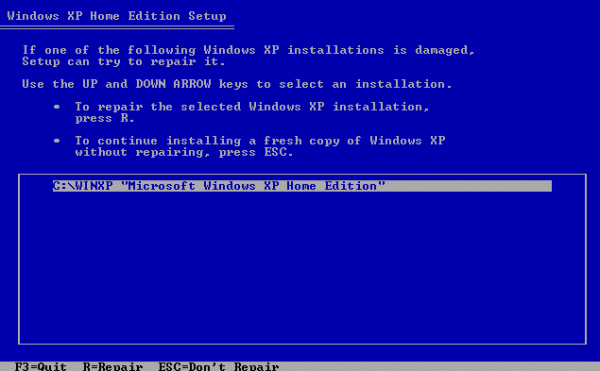
Choose R
In this case, your data will be saved and the information will not go anywhere.
4 - The computer turns on, the operating system starts to load, but then the screen turns blue and something is written on it in white letters
This is the so-called blue screen of death.
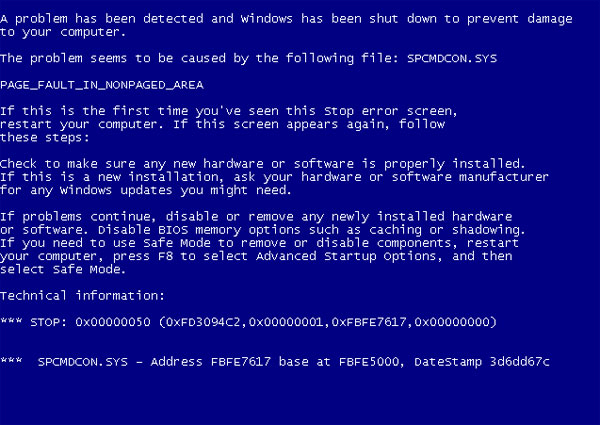
Moreover, if this screen appears again when you reinstall Windows, this usually indicates a malfunction random access memory.
Try pulling out one ruler... or better yet, check the memory with a program, for example, memtest.
5 - The computer turns on, the operating system loads, but a banner appears on the screen blocking operation
This virus. Trojan program.
It will most likely look like this:
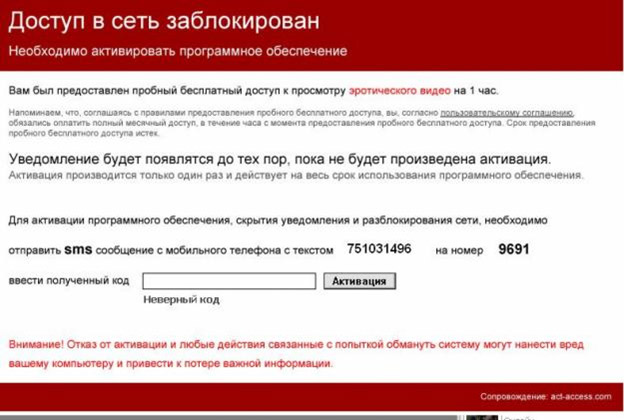
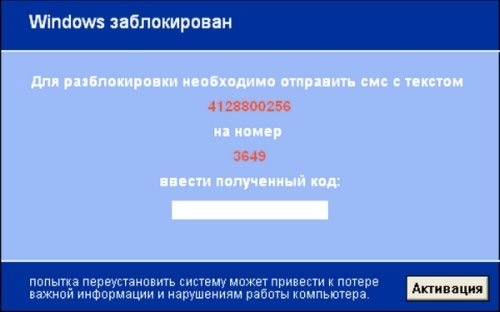
There are a lot of options:

It can take the form of porn banners of various modifications, but the meaning is always the same, they ask you to pay money.
This should not be done under any circumstances, because... still won't help.

You can't do it without specialists.
As a rule, this virus is removed quite quickly.
And finally, about one more malfunction of your computer.
Artifacts on the screen, multi-colored dots, dashes, stripes.
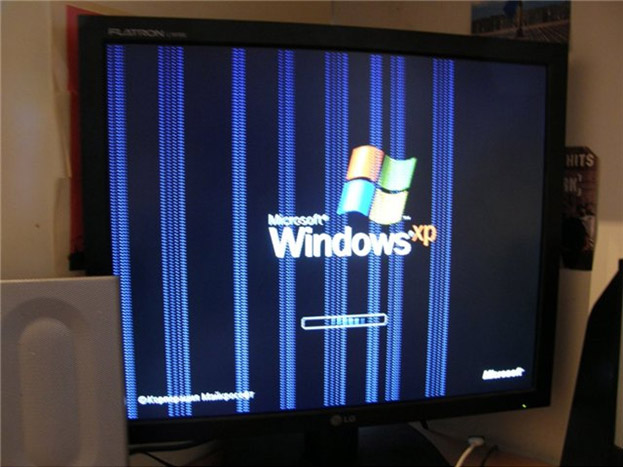
This symptom is very common today.
This is a malfunction of the Video card; unfortunately, repairs are quite difficult and often do not justify the costs.
Black screen when loading Windows 7– the situation, to put it mildly, is not pleasant. Let's try to figure out how we can remove this black screen upon boot. On the Internet you can find information on any problem that arises or ask a question on a topic that interests you, although such information does not always help. We will tell you how the problem of a black screen when loading Windows 7 can be solved on your own, without resorting to the help of various service centers or private computer specialists. At the same time, you will also save a lot of money.
Windows stopped loading?
First, let's consider the option if the operating system does not boot at all. The reason for this may be a failure work hard disk, and this, as a rule, leads to an error when loading system files, or maybe an error when loading some service or some driver.
Previously, if you have heard such an expression, there was a “Blue Screen of Death”, which was very feared by users using Windows previous versions, now it is gone, and instead a black screen appears, although it should not immediately scare you, because you can work with such a screen.
The first thing you should try is Windows Safe Boot Mode. How to do it? When you start the computer, after diagnosing the BIOS, which occurs without your participation from the very beginning of the computer, you need to press the F8 key and hold it for several seconds. In the on-screen menu that appears, select “Safe Mode”. See the screenshot below.
What does Windows Safe Mode mean?
Safe Windows mode(safemode)– this is a special mode, by selecting which you will start only the main services and at the same time only the main functions will work. For reference: this mode is available in all Windows operating systems (from Windows XP to Windows 7).
Very often there are cases when this startup mode is necessary, this is when the system is infected with viruses. You also need to log in in this mode if you need to copy information from hard drive when on Windows computer won't start.
When you enter “safe mode,” you will be able to disinfect your computer, while restoring files that were damaged in the operating system, thus restoring Windows functionality.
Starting Windows in this mode, both in Windows XP and in Windows 7 or other operating systems, is the same. Let's see the sequence of actions.
1. When the computer is turned off, you need to turn it on by pressing the power button. With Windows running, reboot.
2. First, when you start the computer, the logo of the main system appears, that is, BIOS input/output, as well as data on the results of testing the computer: processor, memory, hard drives and so on. You need to not miss the moment when testing is almost completed, and Windows has not yet started to start, you need to press F8, which is located on the keyboard in top row. (It is more convenient to press F8 quickly several times). This is instead of Windows loading automatically, that is, in normal mode it leads to the appearance of the startup selection menu.
3. You will be offered a choice of Windows boot modes: several safe modes or “Regular Windows boot” to choose from:
- Safe mode- This is the standard option; it starts Windows with a minimum of features. It should be used in cases where the computer does not have an Internet connection or local network, as well as if it is necessary to block network access while Windows is loading.
- Safe mode with loading network drivers– if you select this mode, the network function will be additionally added.
- Safe Mode with Command Line Support– here you can additionally enter commands to work with operating system files from the keyboard. This mode is intended for professionals, that is, system administrators.
4. Selecting one or another safe mode option loads the operating system Windows system accordingly selected parameters. You will visually see the difference compared to the normal launch mode by seeing indications of which system drivers are currently loading. When Windows is finished loading, there will be a message that the system is loaded in safe mode. You may need to confirm entering this mode, it all depends on the operating system.
If Windows boots in safe mode, then the cause of the problem must be looked for in some service or driver.
Sometimes, it is impossible to boot Windows even in Safe Mode. If you know the name of a driver or file that is preventing Windows from loading, simply disable it.
To do this you need to insert installation disk Windows into the drive and boot from the operating system CD. When the first installation window appears on the screen, you need to press the key to go to the Windows recovery menu.
Next, you will be asked to select a copy of the operating system; this is when not one, but several operating systems are installed on the computer. You need to select which one you want to restore, and then press the key.
Today, most people use the Internet, the original source, why it appears when loading Windows black the screen is the Internet itself, more precisely, viruses that we pick up on not very high-quality sites with pornography, or when downloading a program from a site with a bad reputation, and the like. Some people believe that a black screen may appear after updating the operating system; this is only possible when your Windows 7 is not original, but broken, and activated using cracks, patches, and keygens. You need to download an original, high-quality image and activate it legally, or buy a licensed distribution of Windows 7.
Based on the above, we have identified two options for this problem: illegal activation with subsequent updates and the second is viruses and Trojans.
І. Let's look at the first option, why the black screen when loading Windows 7 is related to activation and subsequent updates.
If the following message appears on the black screen in the lower corner: "You may have purchased a counterfeit copy software. This copy of Windows failed authentication" , it turns out that you are using an unlicensed OS. In those who use Windows version with a license and accordingly has an activation key, you just need to reactivate Windows, you can also contact Microsoft technical support, but if you have broken Windows, then the whole problem is from Windows updates KB971033, this is what checks your OS for authenticity.
ІІ. Black screen when loading Windows 7, if your the computer is infected with viruses or trojans. What to do?
Option #1:
1. We call the Task Manager, to do this, press the “Ctrl+Shift+Esc” keys simultaneously, and the “Task Manager” window will appear, then click “Application” -> “New task”, in the window that opens we write “regedit”, at the bottom in the screenshot.
2. After the “Registry Editor” window appears, you need to find the following branch in the registry:
HKEY_LOCAL_MACHINE/SOFTWARE/Microsoft/WindowsNT/CurrentVersion/Winlogon
Double-click on “ Shell“, in the window that opens there should only be an entry explorer.exe, if there are other entries, then they need to be deleted, leaving only “explorer.exe”, if there are no other entries except the “explorer.exe” entry, then you need to delete it, and then create it again new entry where to enter the value “explorer.exe”, this does not always help, of course, but you still need to try.
Option #2:
What should you do when the first option doesn’t help? The task manager does not open because it was blocked by the administrator, and system restore does not help either, even if you reboot the system once again, neither safe mode nor edits to the registry, what then?
And the last thing remains reinstalling Windows. But there is another solution, and it is quite simple - this is sticking shift, we think everyone knows about this.
1. You need to press the key five times quickly shift, or you can just press and hold it down for about 10 seconds, then a window will appear with the inscription “Turn on Sticky Keys?”
2. Let's go to center special features , where we turn off keyboard shortcut.
3. IN top corner we write “Task Manager”, or you can simply write “dis”.
4. When you open the “Control Panel” window, you need to go to the “System” item, or you can do this through (“Administration”, then the “System Configuration” item, where we go to “Tools” and of course “System Restore Confirming the restore point”
After all the manipulations done, we advise you to download the free MalwareBytes Anti-malware utility to check your system, it will help you find all the viruses and Trojans on your computer, from which this very black screen appears. Ask why this program, yes because antivirus programs they simply don’t see, and therefore ignore all these viruses, and even Trojans. To avoid problems associated with the appearance of a black screen when loading Windows, it is also recommended to use programs to optimize your computer. And one more note, we recommend that parents limit your children’s access to low-quality web resources, and thereby you will reduce the risk of infecting your PC with viruses and Trojans.

